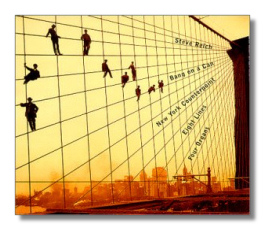
The Internet's Premier Classical Music Source
Related Links
- Reich Reviews
- Latest Reviews
- More Reviews
-
By Composer
-
Collections
DVD & Blu-ray
Books
Concert Reviews
Articles/Interviews
Software
Audio
Search Amazon
Recommended Links
Site News
 CD Review
CD Review
Steve Reich

- New York Counterpoint
- Eight Lines (Octet)
- Four Organs
Evan Ziporyn, clarinets
Michael Gordon, Lisa Moore, Mark Stewart, Evan Ziporyn, keyboards
James Preiss, maracas
Bang on a Can/Bradley Lubman
Nonesuch 79481-2 DDD 44:44
These are recordings that originally were released as part of the 10-CD Steve Reich box (Works, 79451-2) that Nonesuch issued in 1997. Everything else in Works was a reissue, except for Music for 18 Musicians, so it makes sense that the label separated this material out to appease cost-conscious collectors… although they didn't have to wait this long!
New York Counterpoint, the first work on this CD, is the most recent. It was written for clarinetist Richard Stolzman, and it is scored for nine B Flat Major clarinets and three bass clarinets. A 12-person recording or performance is possible, I suppose, but Reich envisioned that the soloist would play his part "live" along with pre-recorded clarinet tracks. This was the approach Reich took in his other "counterpoint" works: Vermont Counterpoint (flutes) and Electric Counterpoint (electric guitars). The title is not random; canonic counterpoint gives this music its hermetic quality, and one can draw parallels between the music's busy patterns and the busy patterns of city living. There are three movements, marked simply "Fast," "Slow," and "Fast." Reich always throws just enough kinks into the repeating patterns to keep the music interesting. Evan Ziporyn, multiplied by twelve, manages to be both precise and funky.
Reich was dissatisfied with Octet, a work from 1979, and he revised it in 1983 by adding a second string quartet and changing its name to Eight Lines. In its present version, it is scored for two string quartets, two pianists, and two woodwind players who must be adept at switching instruments. Once Reich winds up this musical clock, it keeps on going, although the work's five divisions are indicated by sudden shifts in harmony. Eight Lines shimmers with happy activity, and while the work's contrapuntal game-playing may not be immediately apparent, listeners not averse to Minimalism should enjoy the evolution, now slow and now fast, of Reich's raw materials. Bang on a Can turns in a rock-steady performance.
Four Organs, a work from 1970, is the most controversial. It's the Boléro of Minimalism, although it's even less directional than Ravel's masterpiece. To the unceasing and even shaking of maracas, four organs expand and contract a dominant eleventh chord through the addition and subtraction of pitches and durations. That's all there is to it. It's a little maddening, but fun, if you surrender. (The New York première jerked the chain of many of the audience members, and one attendee ran for the exit screaming, "All right, I'll confess!") James Preiss wins an endurance award for his tireless maraca-shaking, and the four keyboard players are stoic throughout. The stereophonic separation of the keyboards clarifies Reich's textures.
There recordings were done in New York City in 1996, and the sound is just fine. Urban photography by Louis Stettner adds to the CD's visual appeal. My only complaint is the short playing-time. Forty-five minutes is too short for a full-price CD.
Copyright © 2000, Raymond Tuttle




















